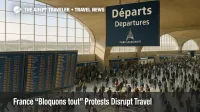Strikes in France
Title: Strikes in France: What You Need to Know as a Traveler
Introduction
France, with its enchanting and dynamic culture, history, and art de vivre, is a top global travel destination. The country invites millions of visitors each year, eager to discover its iconic attractions such as the Eiffel Tower, Louvre Museum, Côte d’Azur beaches, and the list goes on. However, there is an essential aspect of French life that may significantly impact a traveler’s experience: strikes. Strikes (grèves in French) are deeply embedded in the country's labor culture, and it is not uncommon for strikes to occur in various sectors. As a traveler, understanding and preparing for the possible effects of strikes on your trip is crucial for a smooth and enjoyable experience in France.
Importance of Strikes in French Culture
The concept of striking in France dates back to the 18th Century with the influence of the Industrial Revolution, giving rise to workers' rights and the significance of labor movements. Over the years, strikes have shaped the country's socio-political landscape, playing a vital role in gaining and maintaining workers' rights such as a shorter workweek, increased wages, and better working conditions.
Strikes in the French society symbolize a collective voice by concerned workers to express their dissatisfaction and negotiate their demands. French people take great pride in their right and freedom to strike, which is protected by the French constitution's Article 7. The importance of striking in France is further evidenced by the active role played by trade unions in organizing and coordinating strike efforts among various sectors.
Travel and Transportation Strikes
Strikes in France often impact the travel and transportation industry, which can pose considerable disruptions for international and domestic travelers alike. Strikes commonly affect areas such as, but not limited to:
- Air Travel: Employees of national carrier, Air France, and air traffic control staff across all airlines participate in industrial actions, which typically result in flight delays, cancellations, and disruptions at major airports in French cities.
- Rail Travel: Strikes by national railway company, SNCF (Société Nationale des Chemins de Fer Français), and Paris' public transit operator, RATP (Régie Autonome des Transports Parisiens), have a direct impact on rail transportation, including commuter trains, residential services, and international services (such as Eurostar and Thalys).
- Local Public Transportation: Strikes can disrupt bus, metro, and tram services in urban areas managed by RATP and other regional transportation authorities.
- Taxis: Local taxi drivers can strike either individually or collectively to protest ride-sharing services, competition, and regulations. This leads to reduced taxi availability or prearranged taxi protests.
Planning Travel During Strikes
While the occurrence and duration of strikes are uncertain, French law requires a minimum 48-hour notice by unions prior to strike initiation. This announcement allows travelers to anticipate potential disruptions and make timely adjustments to their travel plans. Here are a few key steps to follow for a hassle-free travel experience during strikes:
- Stay Informed: Keep a watchful eye on the local news, major unions' announcements, and company websites. Additionally, follow social media updates, travel forums, and travel alerts from various institutions that can offer advice and valuable real-time information.
- Anticipate Delays: Given that service-level reductions are not uncommon during strikes, preparing for backups is vital. Allocate additional time for travel, especially if connecting flights or trains are involved.
- Develop Contingency Plans: Consider alternative means of transport—while a train strike may be in effect, bus services or car rentals might still be operational. Local authorities sometimes extend operating hours for public transport during strikes, which can be advantageous.
- Flexibility in Accommodations: Book accommodations with flexible cancellation policies or that allow for last-minute changes. It can be helpful to map the proximity of your stay to the attractions you plan to visit, so that walking or cycling can be considered as an alternative means of getting around during strikes.
- Travel Insurance: Purchase adequate travel insurance to cover any potential costs incurred due to strikes, such as cancellation or delay fees, additional accommodation expenses, or other unforeseen expenses.
Traveler Rights During Strikes
French and EU laws provide certain rights and protections for Western-European travelers affected by strikes. These are:
- Air Travel: EU Regulation 261/2004 stipulates that airline passengers have the right to be informed about strikes, receive assistance (meals, accommodation, and alternative transportation), and claim compensation for canceled or delayed flights.
- Rail Travel: The SNCF guarantees passengers refunds or exchanges on tickets for train services affected by strikes. If a traveler's journey is delayed due to strikes, they may also be eligible to receive partial compensation through the G30 guarantee (for delays over 30 minutes).
Finally, striking is an integral part of French culture, and it is essential to respect these labour movements. Remaining patient and understanding is vital when discussing or asking for information about strike disruptions from service workers, who are merely exercising their legal rights. By staying informed and prepared, travelers can successfully navigate through any potential disruptions during their visit and continue to bask in the charm of France.
Eurostar French Strike Cancels London Paris Trains

Marseille Port Strike Blocks Cruise, Corsica Ferries

Champagne Strike Reims Tours, Tastings Feb 3

French ATC Strike Warnings Could Hit Summer Weekends

Paris Rail Strike Disrupts Trains January 13, 2026
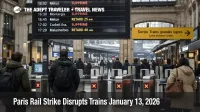
France Rail Strike May Disrupt Trains January 13, 2026
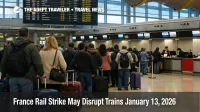
easyJet France Cabin Crew Strike, January 1, 2026
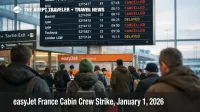
Louvre Strike Paris, Partial Reopening, Closures Possible

Paris Louvre Strike Closes Museum, Refunds, Backup Plan

Louvre Strike Closes Museum In Paris December 15, 2025

Paris Louvre Strike Threat May Disrupt Visits Dec 15, 2025

France December 2 Strike Spares Most Trains And Metro
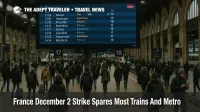
France December 2 Strike To Disrupt Trains And Paris Transit
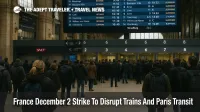
December 2 France Budget Strike Hits Paris Transport

December Strikes Hit Europe, New Zealand Flights, Trains
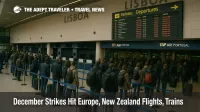
France Transport Unrest Eases, Keep Light Monitor
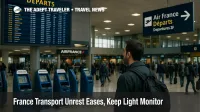
November Protest Watch: Budget Actions May Disrupt Travel
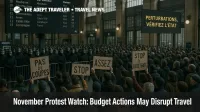
France strikes and protests: What travelers should expect

France ATC strike suspended for October 7-9

Paris protests and ATC strike: traveler advisory
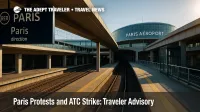
France ATC strike October 7-10: advance notice

France rail strike: What changed on October 2
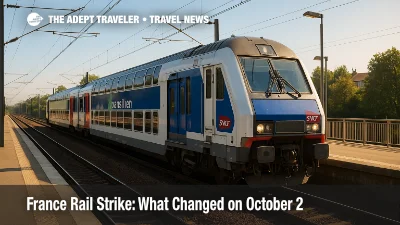
France's October 2 rail strike: Limited impacts, here's how to plan

Paris Air Traffic Control Strike Postponed to October 7 to 9

France "Bloquons tout" protests disrupt roads, rail hubs, and airport transfers
